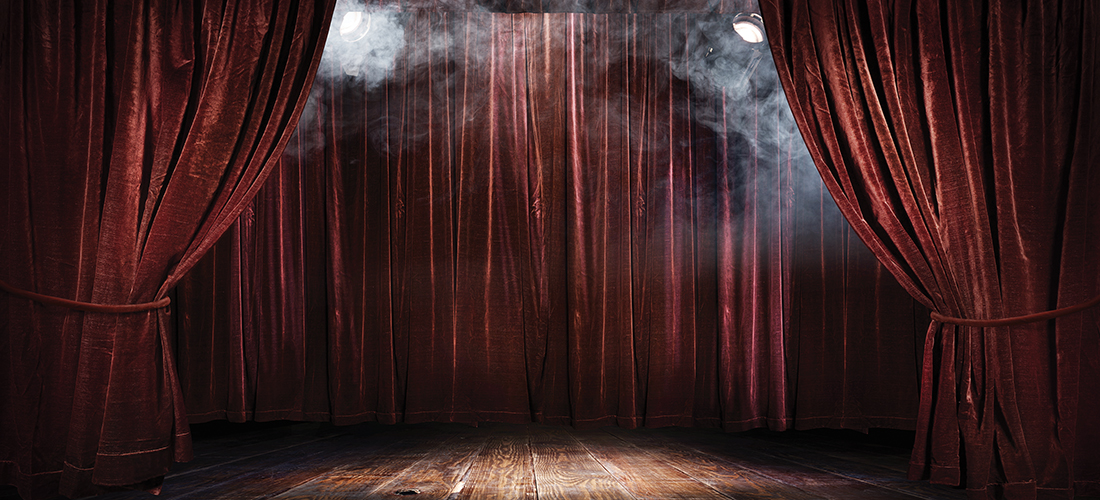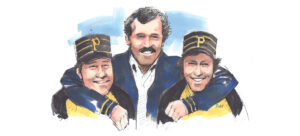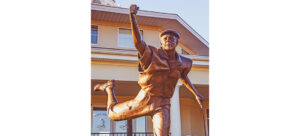
The Dread, Stage Left
Taking a leap into the great unknown
By Joyce Reehling
It was night number 210, a long run for most shows, and there she stood just off the stage waiting for the curtain to go up.
June Talley was used to this moment, a moment just off to the side when her second reality would kick in — she would spend the next two hours going through a piece of a life that must, at the same time, seem unknown and yet highly rehearsed. A life in the theater was both the real and the staged real.
But this night she was feeling that awful sense of doom, frozen in doubt and fear. The Dread was upon her.
Why now? Why, when I know this woman, this play, better than I know myself? This was not the first time that June tried to untie this knot.
She once feared that the desire to run from this fright, run from the theater and hide in some dark spot, belonged only to her. She talked about it with Danny Stone, her stage husband, only to discover it had happened to him — and to all of the actors she knew. She was not alone.
She laughed one night at dinner after the theater while gathered around a table at Joe Allen’s — the longtime theater bar and home-away-from-home for many actors. They all shared stories of this fright and wondered what would happen if one night, at about 7:59 p.m., The Dread hit each and every actor at the same time. What if they all turned and gave in to the fear and walked away? Thousands of people sitting in dark theaters expecting actors to live out the play but when the curtain went up no one, not a single person, could walk on stage?
Samuel Beckett would love it. The producers would sue and Law & Order would have a new case trying to puzzle out if this was breach of contract or a mystical moment of The Dread claiming all of them, making them all powerless to go on.
The laughter at the table that night was the comrade-in-arms, all-in-the-same-foxhole-together kind of laugh — a sound that was playful but bordered on real fright. Everyone knew what The Dread felt like and how you could sense yourself almost turning to walk away, but then the lights went brighter and the pull of honor kept you there. You somehow went into the awful unknown.
But June did not scare easily, and this Dread had visited her before.
It’s that dark thing that tells you that so far you have been lucky, no one had figured out that you can’t act, that you might forget not one line but ALL your lines. The Dread whispers “fraud” and “imposter” as you speak every line.
The Dread grabbed hold of Sir Laurence Olivier so tightly that for years the poor man performed not because he wanted to but because had he not done so it would have tanked his beloved National Theatre. He could not, would not, make eye contact with any actor, and he had the stage manager tell each new member of the cast that they “must never, at any point, speak directly to him. They must look to one side or the other and never make eye contact.” It may have abated over the years, or maybe it never really left the lord of the theater. He was handsome, famous and lauded and still The Dread found him, so why not June in this slight but funny comedy?
“Five minutes to curtain” is the call to arms for actors, and so it was that June began her walk down the steel stairs from her solo dressing room to the stage level. The prop master, Jim, handed her the book she carried on stage.
“So how’s Tom?” he asked. Tom was her real husband, the one at home.
“Oh, you know, still hates the Yankees and loves the Cubs — what can I say?”
Jim laughed and shook his head; he was a Mets guy.
June glided to her spot, where she waited to enter. She was fine right up to the book and the question from Jim, and then The Dread appeared just to her left. He began to whisper, “You can’t do this. You never could and everyone knows it. You are a fool to go out and fail in front of 750 people. Before you are even home the Times will have it splashed all over tomorrow’s paper: ‘June Talley crashes and burns in front of packed Saturday night crowd — never to work again.’”
A laugh froze in her throat, and she thought, for one split second, that it was all funny, but a chill went up her right side and straight to her heart and worse still, into her brain. The demon was a dark and deepening shadow she felt more than she could see. She silently shouted: “Get out of my head and my theater. Leave me alone.” She meant it, but The Dread paid no heed.
“Places for Act I, ladies and gentleman, places.”
The murmur in the house began to die down as the lights shifted and the curtain began a slow pull up to reveal the lovely drawing room of the play, the sound of a dog barking off in the distance, and the light on the set told us all that it was late spring with a touch of summer in the air. The lovely room was filled with fresh cut flowers and had the promise of a comedic evening.
She walked to the window, set the book on the ledge as she had done for 210 other nights, gently pulled up the window, breathing in the evening air.
She turned and said, “If tonight does not get them to fall in love, nothing will.” And then came the split second when she could not, for the life of her, remember what came next. She could see Danny just off stage and she looked at him with panic in her eyes.
“Whatever am I doing here? What should I be doing to make this go well?” she ad-libbed while looking into the wings. Danny knew what was happening, so on he came, making up a few lines to help get her on track, then off they went — as rehearsed — as they had done for 210 other shows.
“Good God,” she said at the intermission as she and Danny bolted up the stairs to change for Act II, “do you think anyone noticed?”
“Darling, this poor comedy is hung together so loosely that no one would notice if an elephant took to the stage . . . thank God for genius comedic skill or this thing would have closed weeks ago.” They both laughed at how untrue that was. It was a fine comedy and they both were very good in it, but it was lovely of him to obscure the scary feeling of not remembering.
The curtain came down that night to a standing ovation, as it did nightly, whether they deserved it or not — such is the Broadway audience.
June began reading the script nightly before “five minutes” was called, even though she knew every word. The Dread had found its way into the theater and the only defense was preparedness and laughter. Thank God for Danny, thank God for the rest of the cast and crew who made light of it and then lived in fear that they would be next.
As The Dread headed for another theater he paused to tip his hat because she had not broken down and because Danny had been a brick.
The next night someone in Phantom of the Opera forgot the first verse to “Music of the Night” and everyone in June’s show knew he had moved on. The cast laughed at the telling of the ad-libbed lyrics that night as actors gathered at Joe Allen’s bar after all the shows let out. The guy who played The Count told the story with everyone falling about at his impersonation and joking about it all.
No one knows better than an actor how a good laugh can dispel fear and nerves. Should you be in the theater on a night someone seems to be a bit off, or starts stumbling over lines, look just off stage, at the edge of the curtain. You may see a shadow looming, then turning to leave because his work there is done. PS
Joyce Reehling is a 45-year veteran of the New York stage both on and off Broadway. She is a proud member of Actors Equity and Screen Actors Guild-American Federation of Radio and Television Artists. She now resides in Pinehurst. She does not miss The Dread.





